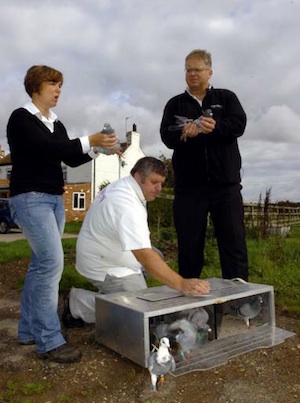Trefor Davies isn't disguising the fact that the carrier pigeons—named Rory and Tref—are anything more than a rank publicity stunt. Not only that, but it's a derivative publicity stunt, having already been run once in South Africa. But that's fine, because it nicely illustrates Davies' complaints about the state of rural broadband in the UK.
The idea was simple enough: Rory and Tref would be tagged with RFID chips, fitted with microSD memory cards containing several hundred megabytes of video, then released from a Yorkshire farm. The pigeons would fly about 60 miles with the memory cards, while the farm's Internet connection would be used to upload the same video to YouTube. Would the pigeons carry their data back to their loft before the farmer could upload the clip?
The stunt was designed to have the pigeons win, of course, just as it was in South Africa. On his personal website, Davies said this week that he was "expecting a convincing avian victory."

Davies isn't just a concerned citizen; he's also the chief technical officer of a UK ISP called Timico, and he's upset about the state of UK broadband outside of urban areas, especially when it comes to upload speeds. He told the BBC today that "the farm we are using has a connection of around 100 to 200 Kbps (kilobits per second)... The kids need to do school work and the farmer has to submit online forms but the connection is not fit for purpose."
The test doesn't show much—why not have the pigeons fly to YouTube's servers for a more accurate comparison?—but pedantic questioning misses the point, which is clearly that the media loves ridiculous stories involving animals that slow upload speeds can easily keep people from anything like full participation in online social life and that rural users are on the wrong side of a digital divide.
The pigeons won, of course. This afternoon, they arrived (a mere one second apart) at their loft in the city of Skegness after only an 75 minutes; only a quarter of the video file had been transferred over the farm's broadband connection.
"The pigeons got back a significant amount of time before I did but I was hampered by the Humber Bridge road toll (the pigeons got off free with that one but at least I kept the receipts) and the fact that I headed down the M180 in the wrong direction," wrote Davies today. "We killed the upload after around three hours when it was 60 percent or so through. You have to excuse the element of vagueness there—chasing pigeons takes a lot of concentration."
Fortunately, Davies had enough concentration left to immediately tweet the news of their landing.
reader comments
90